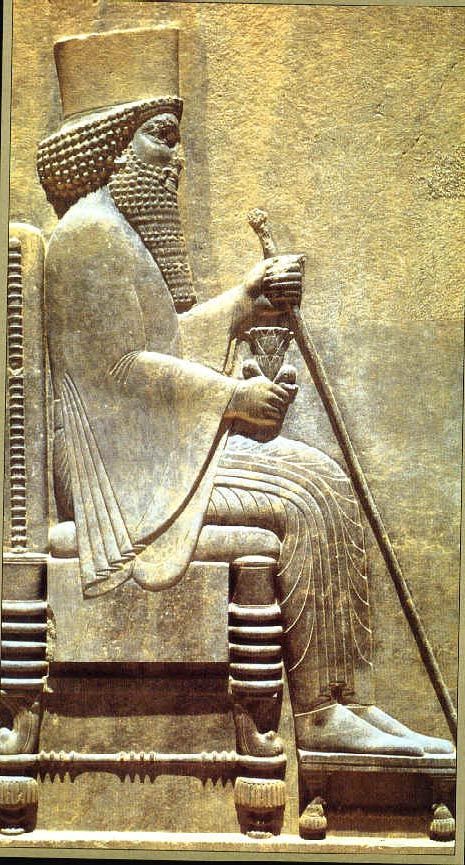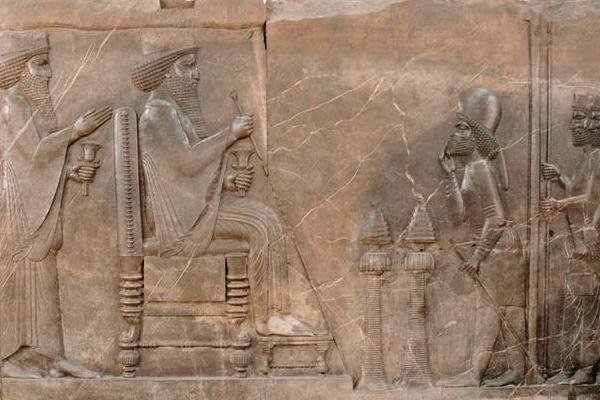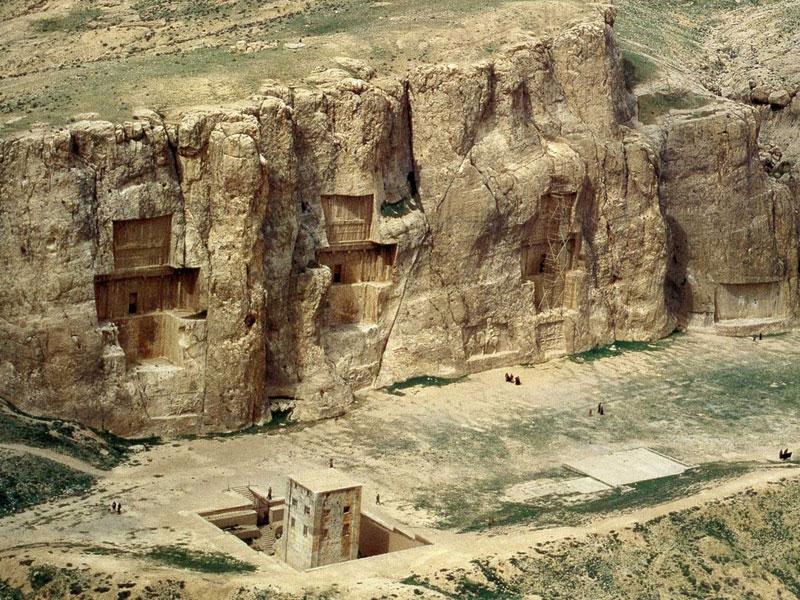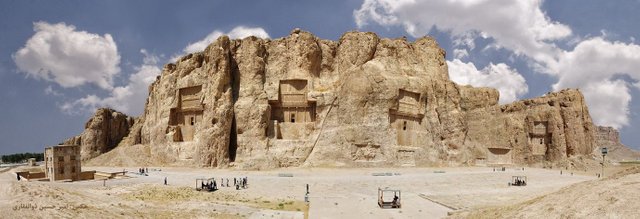Darius I, the son of Vriestasp, was called Darius the Great, the third king of Achaemenid. In 522 BC, with the help of a number of heads of the seven great Persian families, the kingship of the Achaemenid dynasty was restored to the Achaemenid dynasty by killing the Mausoleum of God, who, as Beriah, was the son of the great Cyrus on the throne. After that, he began to thwart internal riots. Strengthened the imperial system and annexed several lands to the monarchy. He started making gamers (Persepolis) during his kingdom

Another of his work was the digging of the Red Sea to the Nile River and then to the Mediterranean Sea. His tomb is in the heart of Rahmath Mountain in a place called Rostam in Marvdasht Fars (near Shiraz). His fame in the west was due to the failed Iranian-Greeks battle at a place called Marathon. He started making gamers (Persepolis) during his kingdom. After Jahangir Cyrus and Cambyses all over Asia, he was considered one of his realms.
Reach the kingdom of Darius the Great
After receiving the throne, the Guatemala or the Father Beria took all the women of Cambyses to a wife. One of these women, Fidelia, was the daughter of Etance (Utaneh or Hutan), one of the most powerful nobles in Iran. The first one who, after seven months of rule, came to Guamat to suspect that he was not the son of Cyrus, but was a spy man, he was Otnos. He inquired about his daughter and his daughter informed the father of the outcome of the investigation. Evanesh formed a group of six people, who were confident in their confidence in Pars, that he was in Susa, and with the arrival of Darius from Pars it was decided to bring him in his group. The seven had sworn to take away the usurper. Herodotus called the uprising a seven-year resurrection. In 522 BC, Darius murdered the Guatemala (False Bardia). In this way, the king's throne and crown came to Darius.
Revolt of the Provinces of Iran at the time of Darius the Great
After that, all the provinces rebelled, when Darius and his followers suppressed nine of the kings who fought with him in 19 battles. The first outbreak occurred in Eilam. In Madhhad, a contender who calls himself a hawkish descendant, claimed the Median reign. In Bourse, another contender called Bardia the son of Cyrus. The fact that the insurgents did not always have a single time and had no common purpose or unity with each other was a major factor contributing Darius to the rebellion. The rebellion of Babylon was not less worry than Darius was less than other outbreaks. All the turmoil that occurred in Armenia, Med, Kurdistan, Rukh, and Marv, was violently suppressed, and Darius considered violence as a means of preventing such incidents.
The Bisotun inscription, which reports these endless wars, shows that he was able to secure the order and security of the Imperial kingdom at the expense of the extent of suffering and continuous effort. Satraps, which Cyrus had appointed after the conquest and capture of provinces in every new territory, were often cast in their own hands during the same time, with the Corps and equipment. With the death of Cambyses and the murder of a man whose many of his provinces were known as the son of Cyrus, the aggression of these independent rulers led to the unhappiness of the people, and the people of the provinces gained an excuse for revolt. Darius was a man of honor and, having married the daughter of Cyrus and a number of daughters of the great Persian families, placed him in a position where the Persian and material fame of each, due to their relative or cognitive affiliation, were to this new king who was in favor of He was ally, loyal and even interested.

Army organization of Darius the Great
Restoring security in all these insurgent areas naturally inspired the need for a systematic administrative organization to have Darius, and provided them with the necessary tools and experiences. [6] Darius spent much of his effort to organize the internal organization of the country. As the system of organization he founded, it was followed a little later by other governments, including Seleucia, Sassanians, and even Arabs. Darius was extremely careful not to be bullied by government officials, and with this aim he always moved in the countries of Iran and looked closely at things. Najba, who did not enjoy the care of the king, called him the "circle", but the historians consider this sermon to be his best praise. At the time, he created a regular administrative apparatus in the country that enabled the focus of the affairs, apparently inspired by some of the prevailing Egyptian system in which Darius became acquainted in his youth in his three-year stay, as Najba And the Persian and material lords who often had military morale did not go to the secretary's office, this was done by the tribes, and the Arabs' families, who took up these archetypes, made the Aramaic language in the territory of the Achaemenids in the language of the country. Within 36 years of his reign, Darius performed the following actions.
The division of the kingdom kingdom Darius into several satraps
Darius divided the lands of Iran into several parts, for each one appointed a governor. They said in the language of Enroz, the patron or guardian of the country. The Greeks have written Satrap and numbered sections between twenty to twenty six, but the number of provinces in the inscription is Rostam's pen name of thirty provinces. In order not to be in the hands of anyone, two were assigned to the center, one appointed to the command of the local troops, and the other, in the name of the editor, who governed the country's work. The editor was actually the center's insight in the states, and the purpose of the establishment of this job was to make the center know if the sentences issued to the satraps were enforced. Inspectors from the center were called to watch the state of the state. It is true that these satraps in the realms of their rule, like a puppet king, had undisputed power and dignity, but in fact all their conditions were under the strict and immediate supervision of the king and his "eyes" and "ears", and this allowed them less Demonstrate independence or thought of violating the king's law. At the same time, these controls kept the peasants safe from the exploitation and abuse of satraps, and did not allow the satraps to raise their treasury by collecting taxes and taxes, and in the end they began to think about developing power.
Create a Great Way Dariush
One of Darius's actions in this regard is the creation of a royal road connecting Sarde, the former capital of Lady, to the Achaemenid capital of Susa. Another way was Babylon to Egypt.
Creating the Great Deathly Halloween
In order for the military to reach the necessary places quickly enough, Dariush Lashghi arranged the so-called Javidan Division because he never was able to fill them with empty spaces. The number of these troops was ten thousand.
Taxation of Iran at the time of Darius the Great
Greek historians wrote that Darius made a cash and sex tax for each state. Greek historian Plutarch writes: "Darius has sought to investigate whether the tax imposed on people is expensive, and because the answer is that it is not expensive and people can pay, it will reduce taxes, not to impose on people".
There was no fixed tax in the kingdom of Cyrus and Cambyses. Public income was provided only through gifts and presents. For the occasion of the tax, this rumor was common among the Persians, Darius is a businessman, and from wherever he can make a profit. Cambyses, Jabbar, and the interests of his own citizens, and Cyrus the father, and the patron of the nations and nations, with a heart-warming heart and mercy, continued to be in the comfort of his own accord.
There is no consensus between historians on the suitability or exorbitance of the taxes of Darius. It has also argued that Egyptian farmers rebelled in Egypt through the great taxes in the last years of the reign of Darius.
Connecting the Mediterranean Sea and the Red Sea at the time of Darius the Great
The Suez Canal, when Darius was in India, saw that Egyptian trade with India was difficult due to dryness, and the cost of transportation was over. It was said that the channel known today as the Suez Canal, first published in 609 BC was created and was completed at the time of Darius, and erased the garlic of ships on this channel. It seems that Darius had seen this unfinished waterway on his way to Egypt and asked questions about it. There are references to these questions in the stones written by the Egyptian hieroglyphs to commemorate the channel. Three books of Darius have been discovered in the Suez Canal, the most comprehensive and most important of which are 12 lines, consisting of the encouragement of Ahura Mazda and the introduction of Darius and the order of digging the Suez Fellowship. The two other inscriptions are smaller and include the introduction of Darius.
Uniform currency and unit of measurement at the time of Darius the Great
The constant economic connection between all provinces required a currency unit and a weighted and convertible system throughout the country. Gold coins that were prevalent throughout Iran throughout this period were called Drake coins. In the history of the world, Lydia was the first country in which the coin was made, but in Darius's history, Iran's first coin was created.
Reconstruction of the sanctuaries
Darius in the Bisotun script speaks of the rebuilding of the temples destroying the ruins of the Gomat. They also went to their temples to pay tribute to the Egyptians who were destroyed at their time in Cambyses, and paid tribute to them, and a new sanctuary in Ammon, for the Egyptians, whose ruins still depict the kingdom of Darius. He returned to Egypt the great priest who had been exiled to Susho, and he greatly respected him. Due to these actions, the Egyptians satisfied Darius and considered him one of their great lawmakers.
Great Darius in the Bible
Darius also helped the Jews in the reconstruction of the Jewish temples destroyed by Bakhtel Nasr. The name of Darius the Great is mentioned in the Bible of the Old Testament, in 25 verses. In the Bible, Daniel and Esther have talked about the stability and unwaveringity of the laws of the Medes and Pars in the book of Daniel and Esther. In spite of the difficulty in the authenticity of the books, the importance of the law in preserving the unity of the empire of Darius and his descendants, even Plato, also points to the role of Darius' laws in maintaining and managing his country.
Great Darius Squad
Darius's interest in administrative discipline and security throughout his territory naturally demanded him to use maritime ways to develop economic ties and expedite the probable military transfers, other than land routes, Thought eventually involved him in the Mediterranean with the Greek tribes.
Attach document and Punjab
In 512 BC, Darius, after securing security in the neighboring countries, also added several provinces to Iran, one of them Punjab and the other the document, both located in India. The name of India, of course, is in the inscription of Bisotun in the number of states It is not a subsidiary of the Persepolis inscription that shows that these southeastern provinces should have come to Darius after the wars of rebellion.
Sacred Squad
Darius's action in the campaign against the European Scythians seems somewhat bizarre in these years of development and calm. There are several different perspectives on Darius's purpose and impulse for this battle. Maybe he wanted to punish them because of the devastating attacks he had repeatedly carried to the land of Iran, and forever heeded them of such an attack, this is the probability that Herodotus will come to the fore.
In the land of the Scythians Darius, instead of facing the resistance of these tribes, encountered retreat. Over the course of two months, the Iranian army wandered across the desert plains, seeking the enemy, and the result Darius wanted to do was not immediately achieved. This first Asian campaign against Europe, although damaging Dariush, but the purpose of this campaign was realized some time later, because both the Scythians for a long time did not mind the idea of encroaching on the borders of Iran, as well as the centers of trade in wheat and wood in Greece Under the supervision of Iran.
Translation of part of Darius' inscriptions

I am Darius the Great King, King, King of Persia, King of lands (countries), son of Voshsfs, the grandson of Achaemenid. My father was Wesh-Shafas, father of Vashtasab Ersham, his father-in-law, Ariaman's father, Ariaman's father, Chesh's predecessor, and Chash's father before Achaemenid.
We were called Achaemenid due to the fact that we were a royal and royal family from late. 8 Our family had been King before, and I am the ninth. We are 9 people over and over. At Ahuramazda's request, I was the king and he gave me a kingdom to me.
You see and protect these writings and these roles that I have provided.
If you care about these writings and roles as long as you can, Ahuramazda is very much alive and your life and your life and all your work is accepted by Ahura Mazda.
I hope that if you do not take these writings and roles when you are able to take care and protect, Ahuramazda is not for you and your dynasty is ruinous and what you do, Ahuramazda will waste.
Darius' tomb

Darius died in 486 BC. His tomb is located at the heart of Mount Rahmat in a place called Rostam Rose in Marvdasht Fars near Shiraz. An interesting testament of Darius's language, whose last wish was just that, was inscribed on his inscription.
You are selected as part of the "Make the World a Whale" challenge, congratulations and good luck on your Steemit journey (-:
https://steemit.com/challenge/@clumsysilverdad/make-the-world-a-whale-contest-challenge
Downvoting a post can decrease pending rewards and make it less visible. Common reasons:
Submit